#but that one scene where elektra breaks into matt's house while he's not there
Explore tagged Tumblr posts
Text
and for my next trick I'm taking two women who are in 1 panel together and making them kiss. with tongue.
#look i dont know a lot about elektra yet#because ive only read her first two appearances so far#and i only know so much about heather#but that one scene where elektra breaks into matt's house while he's not there#and then heather walks in#there's potential... im just saying
1 note
·
View note
Text
“Blind Man’s Bluff”: Psychic Swashbuckling and Spider-Man!
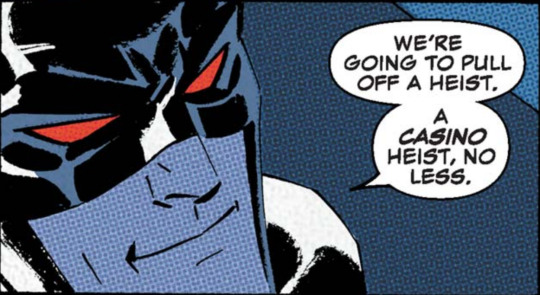
On the whole, Soule’s run was fairly weak for me, especially following on the heels of Waid’s fantastic work on the comic. But there were elements that I really liked, so I want to highlight some of those while waiting for Zdarsky’s run to begin! One of the stand-out story arcs was #8-9 (titled “Blind Man’s Bluff”), which is half team-up, half heist, and just plain fun.
This story hinges on a simple-yet-fantastic scenario, with Matt engaged in some high-stakes gambling, and it starts off with one of the best, most characteristically Matt Murdock-y openers in years:

Matt: “I raise. Fifty thousand.”
Matt (caption): “These cards I’m holding? Absolutely no idea what they are.”
(One tragedy of this arc is the dang brown hair, which I might have taken as part of his disguise if it weren’t pervasive throughout significant chunks of Soule’s run. Hopefully, this trend will die a quick and permanent death now that the Netflix show has ended.)
We eventually learn that Matt is in Macau on superhero business, hunting down a briefcase stolen by Black Cat, and has engaged in this game of poker to get closer to those protecting it. But his reasons for pulling this stunt feel irrelevant. The scenario is good enough that it stands on its own. Matt is in disguise, pretending to be sighted, playing Texas Hold ��Em (one of the only casino games he, as a blind person, can even pretend to play, as he explains) and keeping on top of the situation despite all odds by doing the two things he does best: expertly reading his opponents via hypersenses, and being bold as hell.
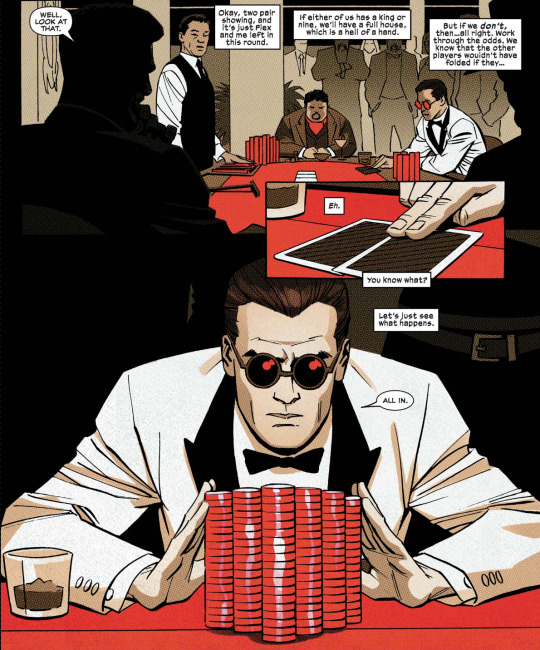
Matt (caption): “Okay, two pair showing, and it’s just me and Flex left in this round. If either of us has a king or nine, we’ll have a full house, which is a hell of a hand. But if we don’t, then... all right. Work through the odds. We know that the other players wouldn’t have folded if they... You know what? Let’s just see what happens.”
Matt: “All in.”
Another treat of this story is the return of Laurent Levasseur-- one of Matt’s less-used civilian identities.

Adhira: “May I join you? That is, unless you would rather be alone.”
Matt: “Not at all. I’m meeting a friend later, but... that’s later.”
Adhira: “Excellent. My name’s Adhira.”
Matt: “Laurent Levasseur.”
For anyone unfamiliar, this is the French identity Matt was given when he went deep undercover for SHIELD in Scott Lobdell’s “Flying Blind” arc.
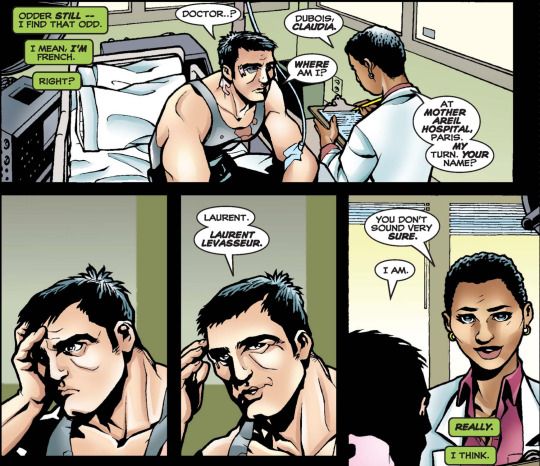
Claudia: “My turn. Your name?”
Matt: “Laurent. Laurent Levasseur.”
Claudia: “You don’t sound very sure.”
Daredevil vol. 1 #376 by Scott Lobdell, Cully Hamner, and Christie Scheele
“Flying Blind” is an imperfect story, but there’s a lot I love about it. Since it is almost never mentioned, this is a fun little callback-- and it’s also not the only one in this issue. As Matt mentions, he also gambled like this while undercover in Europe during Ed Brubaker’s run. What can I say? I’m a continuity nut. I love consistency.
As if Matt’s first poker game weren’t daredevilish enough, the comic gets even more creative and shashbuckly when he reaches the final round of the tournament. This is where he encounters real competition in the form of a telepath, who is employed by the casino to ensure that the house always wins. But of course, Matt is uniquely equipped to deal with this challenge as well.

Matt: “Apex’s powers let him dip into the other players’ minds. It’s why he always wins. He knows what everyone else is holding. He sees through their eyes. To which I say, Mr. Apex... I wish you the best of luck.”
Of course, it’s always great fun when Matt’s hypersenses work to his advantage, but it is even better (and much less common) when his blindness works to his advantage. Again, this is just a fantastic story premise on every level.
And then it gets even wilder, as Apex conducts a full-on assault on Matt’s mind to try to break him down from within.
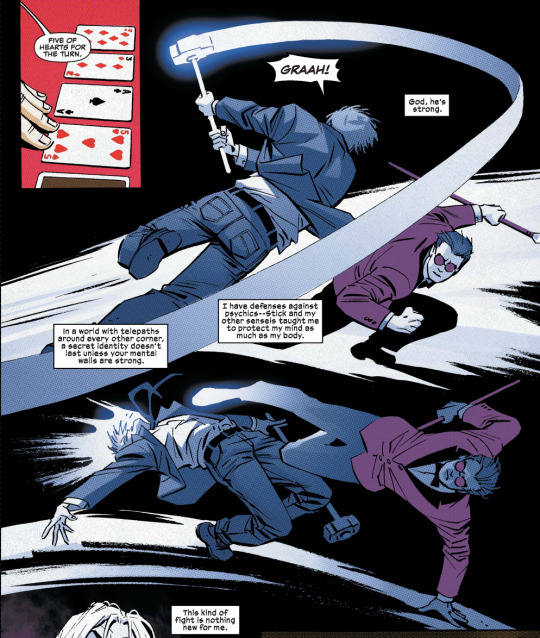
Matt: “God, he’s strong. I have defenses against psychics-- Stick and my other senseis taught me to protect my mind as much as my body. In a world with telepaths around every corner, a secret identity doesn’t last unless your mental walls are strong. This kind of fight is nothing new for me.”
This is an interesting comment because it is inconsistent with previous depictions of Matt’s training. Various psychic/mystical abilities are a key part of the Chaste/Hand power-set, but according to Miller’s version of Matt’s origin, his training with Stick ended before he learned how do to any of that. He is physically capable of keeping up with fully-trained Chaste members, but is a complete amateur in most other respects, which is something I’ve always enjoyed about his team-ups with them.
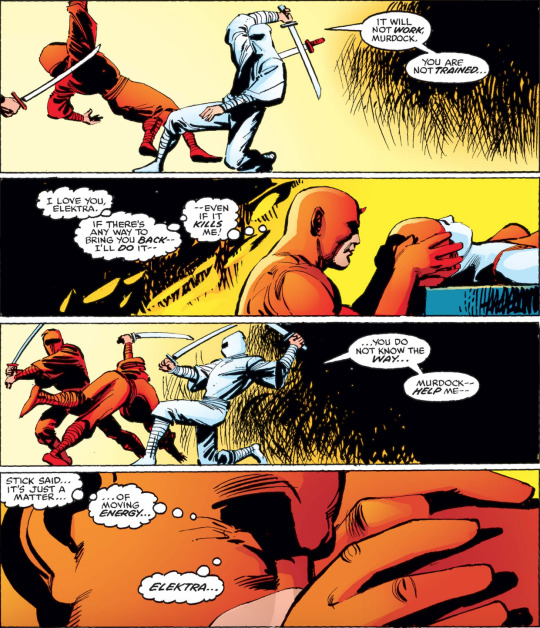
Stone: “It will not work, Murdock. You are not trained...”
Matt: “I love you, Elektra. If there’s any way to bring you back-- I’ll do it-- even if it kills me!”
Stone: “...You do not know the way... Murdock-- help me--”
Matt: “Stick said... it’s just a matter.. of moving energy...”
Daredevil vol. 1 #190 by Frank Miller and Klaus Janson
That said, I will buy the idea that Matt has strong mental defenses, and he has shown an aptitude for this sort of thing (against all odds, he is actually successful in reviving Elektra in the scene above). What he didn’t initially learn from Stick, he could have picked up in his later experiences working with the Chaste and with Master Izo-- the “senseis” I assume he’s referring to in the Soule issue. And it’s true that Matt has experience fending off mental attacks, with “Shadowland” being a major recent example. Though he needed help getting the demon out of him, the practical realities of that struggle probably taught him a lot. And finally, possibly most convincingly-- intense mental willpower is what allows Matt to function with hypersenses without going crazy. That is a form of mental shielding that Stick did pass on to him, and at which Matt is an absolute expert. And so it’s great seeing this expertise displayed via Matt and Apex’s mental battle, in which Matt nearly has his secrets exposed before knocking the guy out.
My favorite case of Matt battling a telepath is still from A Vs. X: Versus, when Psylocke tries to get into his head and just gets blasted by his hypersenses...

Betsy: “Overloading-- feedback--”
Matt: “There’s the answer-- she’s a telepath. And she just learned what it’s like the first time you experience my hypersenses-- it hurts.”
Avengers Vs. X-Men: Versus #4 by Rick Remender and Brandon Peterson
...but this is a lot of fun too.
Having won the tournament (and a huge chunk of cash he can’t use, because it’s not under his real name), Matt finally acquires what he went through all this trouble and risk to get: a hotel room at the casino. Having secured this, he moves into the next phase of his plan, which involves a wonderful team-up with his superhero BFF Spider-Man.
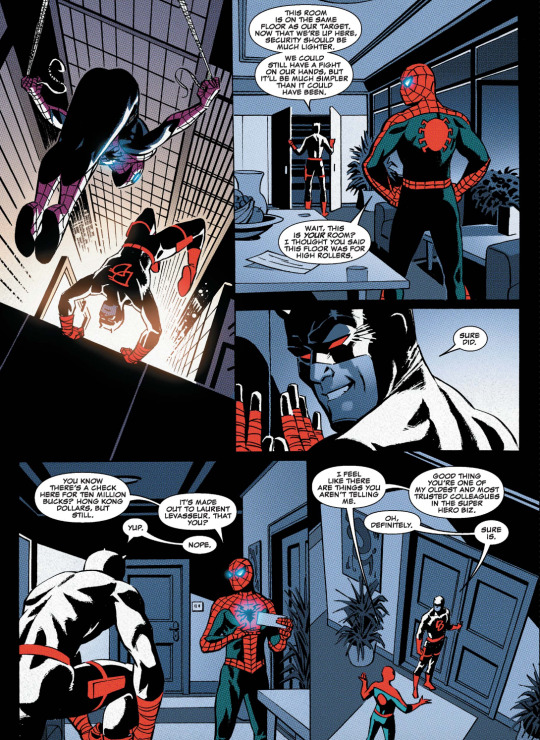
Peter: “Wait, this is your room? I thought you said this floor was for high rollers.”
Matt: “Sure did.”
Peter: “[...] I feel like there are things you aren’t telling me.”
Matt: “Oh, definitely”
Peter: “Good thing you’re one of my oldest and most trusted colleagues in the super hero biz.”
Matt: “Sure is.”
Again, the plot itself feels secondary. Matt needs the room because it allows him access to a restricted floor of the casino, where the briefcase he needs to steal is being held. But it’s the interactions with Peter that make this issue so great. Soule writes both them very well, playing up their banter and the comfort they feel around each other, and thus emphasizing their closeness and the fact that they have known each other for a very long time.

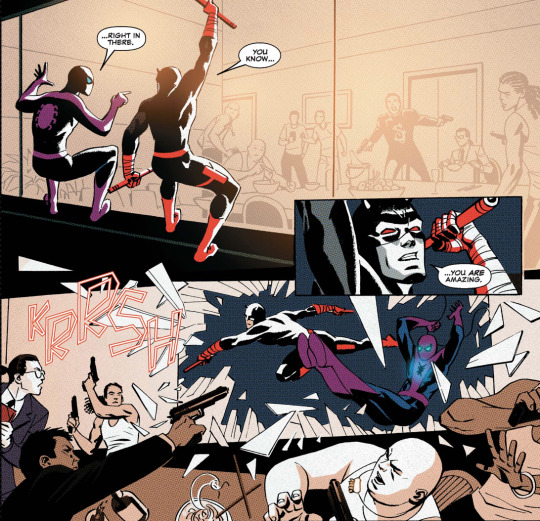
Matt: “This city’s almost completely vertical. It’s all tall towers and mountainsides.”
Peter: “I know, I love it. It’s like a six-lane highway for guys who get around the way we do. [...] I got a Spider-Tracer onto the briefcase before that guy made it into the panic room. [...] I’ve been tracking it ever since the guy got on the helicopter back in Macau.”
Matt: “Good news. Where is it now?”
Peter: “Oh... looks like... right in there.”
Matt: “You know... you are amazing.”
And it’s important that this is emphasized, because of the other key part of this team-up: the fact that Peter no longer knows Matt’s secret identity. While Matt is his casual self around his friend, and while Peter attempts to laugh off this shift in status quo, it is there beneath the surface the whole time. Peter tries to advise Matt on the dangers of being in a “black-costume phase”, he tries to drop hints about how weird it is that he doesn’t know Matt’s real name, and then in the end, when he can no longer just let it slide, he confronts Matt directly.

Peter: “I was thinking about it when you called me to help you down here. I have a lot of memories of adventures we’ve gone on over the years. But they feel... incomplete. Like they aren’t the whole picture. Like a jigsaw puzzle with only half its pieces. And I thought, ‘Gee, that sure is odd, considering that you are, after all, one of my oldest and most trusted colleagues in the super hero biz.’”
This early in the run, the exact details of what happened with Matt’s secret identity haven’t been revealed yet. And this is the first time someone directly addresses the mind-wipe, or even seemingly notices it, so it is extremely significant. (I do think it’s weird that Peter is the only person to notice it, but that’s a topic for another post.) While I feel the mind-wipe was a very bad move, since it damaged so many of Matt’s relationships and negated a lot of decades-old character development, I do at least appreciate the poignancy of this moment; of Peter trying to understand why he can no longer trust someone he considers a friend, and Matt deciding that he can’t bear to outright lie to him.

Matt (caption): “Make something up. You’re an attorney, Matt. You can make anyone believe anything, and Spider-Man wants to believe you. If you tell him something even remotely plausible, he’ll probably-- No. Enough is enough.”
Matt: “The reason you feel like there’s a hole in your memories is because there is. Everyone used to know my identity, and I did something to change that. I’m still the man you trusted. The only differences is that now you don’t know my name.”
It’s an emotional end to a great story arc-- and while I would have much preferred to Matt to get Peter back up to speed, I appreciate the moment for what it is. Hopefully, after three years of this near-complete isolation, Matt will go into Zdarsky’s run with a desire to fully rebuild these relationships that clearly still mean a lot to him.
62 notes
·
View notes
Text
you’re honest. you never lie to me
an essay (?) about Karen Page + the importance of the truth.
I’m going to preface this with yes, I ship Kastle, but a lot of the details, the facts and the principles that will be shared throughout this post are some of the primary reasons I do, and not intended to necessarily change people’s perspectives to their own romantic pairings.
We’re going to open with Daredevil s1, where it all began.
The introduction of Karen’s character is flanked by ‘guilt’ by ‘the truth’ and what it means depending on where you’re standing when you look at it. She’s framed for murder (an ultimate act of dishonesty), because she was investigating the truth - she lost her job, lost everything, in her pursuit of what was actually happening behind the smoke and mirrors of Union Allied. And at this point, it just looked like money being moved around, which, while illegal and immoral, wasn’t as violently criminal as say, organized drug trafficking and gang-related violence (like the Italians or Kitchen Irish).
She relies on Matt and Foggy trusting her. She relies on that blind faith. And the few times Karen lies to them (and she does lie initially) was rooted in her paranoia. Her fear. Especially when you continue further on and she’s almost killed in her holding cell, and she doesn’t know who to turn to, who she can place her trust in.
Enter: Daredevil. (that’s a fine looking high horse)
He’s representative of good, working along the margins of the law (vigilante justice), but it is absolute. Of course, she has no way of knowing the shape of his moral code, but he’s the first person shown to save Karen so she latches onto that ideal fiercely. A continued theme of her thinking that Daredevil is the end all be all; he’s saved her, he does what’s ‘right’, or at least what the man beneath the mask believes to be.
Karen’s story arc through the entirety of season 1 is the pursuit of truth. It starts with Union Allied. It starts with Ben Urich. And then it twists into the guilt of Karen feeling the weight of the truth she unearths - doing what’s right, what’s just, starts to come at an incredibly high price. Karen’s life is threatened ROUTINELY, and she persists. She doesn’t stop.
I don’t think it’s necessarily a death wish so much as it is: people have died on this journey and to stop? To give up because she’s scared? Would be an insult to them directly.
And then she’s at the business end of a gun. And then she’s got so much blood on her hands she can’t breathe.
We now know (with the release of dds3), that Wesley wasn’t the first person she shot. That Karen Page has always been perfectly capable of handling herself but Wesley’s death is important in the shift of her reality.
It isn’t black & white any longer.
Because self-defense has a very narrow threshold and while her life would continue to be in direct danger if James Wesley was allowed to live, right then, and after the first shot into his shoulder, he wasn’t an immediate threat.
Karen emptied the clip into him and buried that trauma, that guilt, way down deep.
But his isn’t the first life she’d taken. It isn’t the first ghost that sits in her shadow.
So why is Karen so interested in the absolute truth, every inch of it laid bare even if it makes her look bad? Even if it’s ugly?
Cut to Daredevil s3e10: Karen.
After two seasons of Daredevil and one season of The Punisher teasing the tragedy of Karen Page’s backstory, we’re given insight into what’s clearly a defining set of circumstances for her later behavior, for her grief.
Karen made bad choices, and bad things happened; her brother dies in an accident caused by her addiction, by her abusive boyfriend and it’s an absolute, soul-rending ache that we see reflected throughout her adulthood thereafter.
But her dad, a man who had no sense of responsibility, culpability, let his denial of their circumstances make decisions for them and was emotionally abusive -- he took away her ability to grieve. Her ability to take the blame in guilt.
He made the death of her brother about him.
Karen was CLEARLY upset when he told her that she wasn’t ‘there’, that the sheriff was going to call it a one person incident because their family didn’t need more suffering. After her mother’s death, now her brother’s, what would that do to her father if she ended up in prison? It was exceptionally manipulative on his part to phrase things the way he did and that stuck with Karen.
A lie. Not the first but the one that defined her relationship with the truth. With honesty. With justice and vengeance.
A lie that blamed her brother for his own death and a lie that haunted her each and every day, and will continue to until she’s able to come to terms with the truth of it.
We see a scene of her looking at the newspaper (a clipping about the accident), and I think there’s a deliberate parallel there to a scene in dds2, which we now segue into. (we’ll come back to dds3 after, I just thought this was a necessary bit of past information that ties into .. well .. pretty much everything).
Onto dds2, or; the inevitability of Frank Castle.
The theme’s that tie Karen to Frank are constant, and, in my opinion, needfully heavy-handed.
Karen learns there’s a man killing criminals, a man who sees the wrong in what people have done and is taking them out with military precision. He doesn’t miss his targets, so why is she lucky enough to get away from The Punisher? What if he knows what she’s done? What if he, like Ben or Ellison, dug a little too deep and saw why she’d come to New York in the first place? Or caught the scent of James Wesley, the gun at the bottom of the Hudson.
What if she deserved it?
The guilt complex manifests tenfold after she kills Wesley, and continues on throughout season 2 with Karen believing that the reason Frank Castle exists as a concept, is due to the nature of the city. That really, these vigilantes are a product of circumstance. When people like Wilson Fisk rise to power, when there’s a wound in a city of that size, it doesn’t just go away. It leaves a permanent mark and Karen’s literally dedicated her energy to defending the downtrodden. To helping those who need help.
To learn the reason ‘why’ behind every defense sentencing.
It starts with: he has to have a reason. He knows who his targets are, it’s not a madman gunning down randoms. So there’s logic to what he does, however, distorted by perception, but logic nonetheless.
We see Karen throw herself headlong into this internal, isolated investigation BEFORE they have reason to dedicate their time and energy to finding a probable defense for Frank.
Karen goes digging before she’s obligated.
Because she needs to know. Her truths (how many of them now?) are all buried, all dead, all six feet under so that desperate endeavor for honesty and absolution drives her to break into Frank’s house after seeing the files. After seeing what happened to him.
And it grows from there.
Karen finds the truth, wants the truth, and starts to see her grief in the haunted flint of Frank’s eyes and while all of this is happening, her relationship with Matt Murdock has shifted into something romantic. She trusts him. Gets girlish and sweet, maybe even a little vulnerable in his company.
And in the middle of Karen talking to Frank, in the middle of Karen rooting around in a past that so many have tried to cover up, to hide, Matt is routinely and repeatedly betraying that trust.
Truth. Honesty. Integrity. Components to the walls that Karen keeps up around her, why she keeps most things, most people, at an arm's length.
They either hurt her. Or they die.
And she wears plenty of guilt for that. Karen’s her own worst critic, her own judge, jury, and executioner.
Now, Matt’s odd behavior is initially explained by Foggy as ‘drinking’, which wasn’t meant to be a lie that’d hurt Karen ultimately. Foggy did as Foggy does; he protects his friends, and maybe he’d panicked a little and that felt reasonable, right? Better than telling Karen Page that the vigilante she’d been enamored with is actually the blind man that she’s grown separate, and intimate feelings for.
Again, we look into Karen’s past and we see that she struggled with addiction; pills, powder, alcohol - she’s been there. And her empathy towards Matt, all those hours spent worrying .. are housed in betrayal, ultimately. And he can phrase it like he’s protecting her but really, they both know better, they knew better, and Matt was probably afraid of what would happen if she knew.
A lie is still a lie, no matter the intentions behind it.
Now Frank’s this sort of ... emotional lifeline for Karen after that first act of heartbreak is echoing around in her mind. Walking in on Matt and Elektra (which, and while I personally resent pitting two women against each other, I recognize the significance and circumstances of; this is all meant to dialogue about Karen Page, not to paint or argue opinions).
She turns to Frank, finds comfort in HIS justice, and it’s definitely an act of emotional projection. Her family is dead. Her family did not, and cannot receive the justice they deserved but Frank’s? That’s an honest to god tragedy (nobody comes out of that okay).
Their relationship continues in such a way that’s built on bald honesty. Even if it’s ugly, maybe especially then. Regardless of whether or not it’s chosen to be read romantically, it is significant, the line Karen has with Frank is probably one of the most important of her character: You’re honest. You never lie to me.
We know why that trait stands out among the rest. After all she’s learned about Frank, knows the skeleton’s in his closet; she doesn’t judge him. Not when the dust settles and the blood on their hands runs the same color red.
Guilt and grief are hard to differentiate when you’re in the thick of it but Karen’s always drawn a pretty distinct line.
No matter what, above and before all else; we are our truths.
And when she collapses in front of her wrecked car (Ben’s, car, isn’t it?), she’s faced with two ghosts: Kevin’s, and Frank’s (he’d told her he’s already dead, what difference does another bullet through another skull make?)
And then he’s dead for real, she thinks. She’s grieving a dead man, loving and mourning him all at once. The scene with Matt hearing her heartbeat? It was done deliberately; he knows what hell he’s put Karen through by then, he knows she’s come to care about Frank in a way that he fundamentally disagrees with, but can’t talk her out of.
But Frank lets Karen know. It’s a pointed scene, on the rooftop. What is it, to be a hero?
It’s not Midland Circle. It isn’t dying, and staying dead but living in the margins and letting your friends hurt.
It isn’t telling her: I’m Daredevil, and letting the mortification and pain and rage of the last year wash over Karen Page.
So we’re at Daredevil s3 (with an inclusion of The Punisher s1, and how loving dead men makes Karen Page switch to espresso)
We’ve already touched on her backstory, so I’m not really going to reiterate that here and now.
But the big Lie. The big HURT for Karen this season is Matt.
He died, but she refuses to believe it (even if she can’t know absolutely either way. Matt’s her friend. As angry as she gets at him, as dumb as he gets, Karen loves her friends fiercely).
He’s ‘back’, but not really. Karen feels absolutely and fundamentally betrayed; if Matt was back, he wouldn’t let us think he was dead.
So much for him promising he’d stop lying.
And at this point? There’s no degree of self-preservation to it, he doesn’t mask it as keeping them safe. He just cannot live with what he’s become. Matt Murdock dies with the love of his life under midland circle and Daredevil’s fit-together broken pieces.
Karen’s don’t fit with his, but she cares, and she persists. Because that’s what Karen Page does.
She helps. In spite of or despite the circumstances, Karen Page does the right thing in the face of all the wrong.
Her forgiveness to Matt is slow coming and hell, her defense of Frank to him at the very beginning communicates volumes as to where her headspace is.
Karen’s tired of grief. Tired of being tired. Tired of people dying in the name of her truth; look at the Bulletin. She’d pushed the Jasper Evans lead, she’d pulled on that thread KNOWING it’d bring Fisk’s wrath -- she still has nightmares -- and that’s because discrediting her, the agent of honesty and truth, is imperative for the liars to keep good in the business of lying.
So Karen uses her truth as a weapon when she goes to Fisk herself.
No one else gets caught in the crossfire because of her. No one else dies. this is the shape her justice takes and it is as brave as it is stupid, admittedly.
We close the season on transparency; all seems well with Nelson, Murdock & Page. Truth sits behind her teeth at all times but lying doesn’t go away, it sheds it skin and it grows and Karen Page values honesty. Values justice.
Not how it looks to her alone. But how it fits into the to City they call home.
#p#my meta.#karen page#daredevil#karen page meta#kastle#kinda?#not really but I want to tag it so people don't have to see it if it's blacklisted!#character: karen page#meta: karen + truth#long post for ts#THIS IS REALLY LONG AND I HAD 100000000000 FEELINGS BUT#here it is#long post
92 notes
·
View notes
Text
In the Ballroom Culture Drama 'Pose,' Stars are Born
Hello! I wrote about the upcoming new FX series “Pose,” which explores the drag ballroom scene of the 80s and was co-created by Ryan Murphy.

A scene from “Pose.” Photo credit: FX
It's hard to write about "Pose," the new drama about '80s ballroom culture debuting Sunday on FX, without discussing the story around the show.
"Pose" made headlines last year when its co-creator Ryan Murphy (one of the most prolific showrunners today, known for co-creating "American Horror Story," "American Crime Story," "Feud," "Glee," and much more) revealed the series will have one of the biggest casts of transgender actors and LGBTQ people of any scripted TV show. Ever. Murphy, who is openly gay and said he'd donate all the proceeds he earns from "Pose" to LGBTQ organizations, has made a conscious effort to hire women, people of color and LGBTQ people in front of and behind the camera, thanks to his foundation Half.
That a show as diverse as "Pose" exists feels like an accomplishment in of itself. To get a show with a cast of actors who are primarily trans and people of color leading a prestige drama series is something to behold. It's 2018 and there have never been so many shows on the air at any given time, but stories highlighting the experiences of trans people are rarely explored, never mind the focus of a TV show. "Pose" is a platform to a number of fresh faces and new voices, creating a space where stars can be born.
Set in 1987 in New York City, the series follows the thriving ballroom scene in uptown, juxtaposing that life with the rise of Trump-era capitalism in Manhattan. With its diverse cast, "Pose" is incredibly specific, sometimes playing like "Paris is Burning" fan-fiction (this is meant in the best way possible). "Pose" also looks like nothing else on TV - it's full of life and, most importantly, color. A terrible trend with prestige TV is the cold and dark color pallets many showrunners often use (Murphy has been guilty of this, too) - navy blues and steely greys have come to signal that This Show Is Important, but actually make things flat and boring to look at. "Pose" is the complete opposite, embracing every color of the rainbow - bright reds and yellows pop on screen during vibrant and dazzling dance-offs. It may be a small detail, but its one that makes a huge difference.
For how groundbreaking "Pose" is, at its core, it's surprisingly quite conventional. The show is a family drama of sorts, as it showcases how queer people, especially those rejected by the ones they love, can come together and choose their own family, forming unconditional bonds. As with any family, those bonds are tested at times, but overcoming obstacles only bring them closer together. The family drama is one of TV's most reliable and relatable forms of storytelling, but there's something rebellious in the way "Pose" utilizes this tried and true format.
"Pose" also begins on a handful of clichés we've seen time and time again in LGBTQ cinema. In the first 20 minutes of the pilot, someone is diagnosed with HIV, while another character comes out as gay and is beaten by his father and kicked out of the house by his mother. But "Pose" isn't a movie, and isn't constrained to a two-hour time limit; in fact, episodes clock in at a full 60 minutes, with the pilot totaling a whopping 78 minutes. Fluid running times may feel daunting, but they allow directors and writers to flesh out these familiar tropes and take them to places that movies cannot.
At the heart of "Pose" is MJ Rodriguez, who plays Blanca Rodriguez. It's a major breakout role for the enchanting newcomer, who oozes star power and commands every scene she's in. Unsatisfied with being a member of the House of Abundance, led by the towering Elektra Abundance (Dominique Jackson), Blanca decides to break free and start her own house. The move sparks a vicious rivalry between the House of Abundance and Blanca's new House of Evangelista. Becoming a house mother isn't easy, and Blanca enlists her own ragtag crew, including aspiring dancer Damon (Ryan Jamaal Swain), fellow ballroom scene competitor and sex worker Angel (the stunning Indya Moore), and others. She's got the support from the ballroom scene's magnificent emcee Pray Tell (the wonderful Billy Porter), who is ready to assist Blanca with costume construction and life advice.
The supporting cast of "Pose" round out the show's lived-in and felt world. The vulnerable Angel is the connecting thread between the ballroom world and the Trumpian life in Manhattan - she's involved in a relationship with Stan (Ryan Murphy veteran Evan Peters), a New Jersey family man, married to Patty (Kate Mara), and a new hire working for Donald Trump's business (lol). His boss Matt (James Van Der Beek, doing his best Christian Bale à la "American Psycho") is a live wire and is the epitome of what many in the drag/trans community desire at that time. Still, the Peters and Van Der Beek stories don't feel necessary or particularly exciting through the four episodes of "Pose" provided for review, though that could easily change later in the season.
Viewers will enter "Pose" through Damon, who Blanca takes in after spotting him dancing on the streets of New York. Her motherly instinct is to push him into dance school, which splits Damon into two versions - the one competing in the underground ballroom scene, and the one experiencing a life some of his closest friends will never see. It's a fascinating journey, but the handsome Swain's wide-eyed performance doesn't always connect, which is a problem because he is the show's avatar at times.
Your mileage of "Pose" will vary, depending on how soapy you like your dramas. There are Big and Powerful Speeches, show-stopping dance-offs and devastating moments in "Pose" that can feel pandering to LGBTQ viewers, but the show maintains a nice pace and never lets up being engaging and entertaining.
The show tackles a number of heavy topics, too, ranging from the AIDS epidemic of the '80s, gender confirmation surgery, socio-economic class, and much more. But "Pose" doesn't feel dated when handling delicate issues. The writing and the performances are strong, assertive and confident, taking on discussions of sex, health, and identity with an admirable frankness. It also finds fascinating ways to take on modern issues within the LGBTQ community. In the second episode, "Access," one of the most provocative moments comes when Blanca and a friend, Lulu Abundance (Hailie Sahar), who is also trans, face discrimination by cis white gay men at a popular gay bar. After being berated with transphobic language by the bar's manager, who kicks the pair out of the establishment, Blanca tells him, "This isn't over!
"It was over before it started," Lulu tells Blanca. "Everybody needs someone to make them feel superior. That line ends with us though. The shit runs downhill, past the women, the blacks, the Latins, the gays until it reaches the bottom and lands on our kind."
It's a powerful moment that rings as true today as it did in 1987. And it's a sentiment that is rarely discussed among the gay community - forget portrayed and expressed with nuance on a mainstream program airing on a premium cable network like FX.
Murphy expertly directs the first two episodes and co-writes them along with Brad Falchuk and Steven Canals, both of whom are credited as co-creators. "Pose" lifts off, however, when they take a step back, allowing trans activist Janet Mock and "Transparent" writer Our Lady J to pen episodes. Authentic voices unsurprisingly lead to earnest and heartfelt results, making "Pose" a fiercely fascinating show that revels in how daringly conventional it is.
#pose#tv#drag#fx#ryan murphy#ballroom#voguing#vogue#lgbt#lgbtq#culture#dance#evan peters#queer#trans
3 notes
·
View notes
Text
Emily Watches Iron Fist, Episode 4
Is Colleen in this one? Yes! Appears 10 minutes in.
Is Claire in this one?
Is Jeri Hogarth in this one? Yes! 13 minutes in.
So this series is very slow so far. I hope it picks up because each review feels like a chore (and no one seems to be reading them. yay!) .
This episode opens with the fakest of fake shots of Danny catching himself on a security camera instead of falling to his death. It’s green-screened within an inch of its life and looks pretty low budget. I wonder if Iron Fist got less money? Maybe that would explain why it doesn’t seem as thought out?
Anyway...
He then falls a short way to a rooftop and knocks himself out. So far the immortal warrior is not impressive.
Danny wakes up in Daddy Faramir’s apartment with Ward. They fight and then Daddy Faramir shows up and Danny is shocked. He hugs Daddy Faramir, clearly remembering how he carried the One Ring without being tempted by it. So he must be a good guy. Right? RIGHT?
I suppose I should call him Harold. Harold explains how he had cancer and was sick. He says someone (Madam Gao!) approached him with a “cure” and it put them in his debt. He died and then was resurrected (like the Hand in Daredevil). Danny is shocked to hear the Hand is there in New York.
... which. Like WHAT THE FUCK ARE YOU DOING IN NEW YORK THEN? Are you just taking a semester off from protecting K’un L’un? I thought you came because of the threat to New York?
Danny says he’d never SEEN the Hand in K’un L’un. Okay now we’re getting somewhere. You were an immortal warrior with nothing to fight. He’s a figure head Iron Fist!
Harold really wants Danny to destroy the Hand so he can finally leave the apartment. It’s confirmed that Joy doesn’t know he’s alive. So he wants Ward and Joy to drop all litigation against Danny, so Danny can focus on fighting the Hand. Ward is annoyed.
Harold says the Hand was the one who wanted that pier deal (the one Joy got the dead boy’s liver for) so badly.
I only really care about this if it relates to Elektra.
Cut to my other bi-racial love, Colleen Wing. Her students have found out about the cage match and have it on video. Cool! Let’s watch it again! Colleen is ashamed. She’s stepped outside the code.
Rand has a press conference welcoming Danny Rand back from the dead. Jeri makes faces from the audience. They ask him about his stay in the mental hospital and... instead of acting ashamed that he was there or railing at Joy and Ward for putting him there. He thanks Joy and Ward for getting him the help he needed to adjust. I liked that moment, even though Danny wasn’t really crazy. He makes in seem like it would be normal to have trouble adjusting and that there is no shame in seeking mental help.
Jeri shows him “his” office, which is really his dad’s old office set up like it used to be. He crawls under the desk to see stickers he sticked there and Jeri makes faces that are amazing. Since I still have goodwill toward Danny, I find this scene charming.
Danny joins a meeting late. He moves his chair to sit by Joy. He demands they sell a drug at cost instead of marked up. As majority shareholder apparently he can do this? Seems very convenient. Everyone else on the board(?) isn’t happy.
Colleen practices fighting for the cage fights. She breaks her wooden punching thing. (Emily knows a lot about martial arts!)
Harold calls Ward. They talk about the reporter who asked about Danny’s psych hospital visit. Cut to Danny and Joy talking. Danny says Harold would be proud of her.
Back to Colleen! She’s got a cool white hoodie now and is ready for another cage match. Thank god for Colleen or else this “martial arts” show would be a show about drug pricing by large corporations. This time she fights two beefy dudes at once. It’s cool. Watch it. Or watch some gifs of it.
Cut to boring Danny and Joy talking business stuff. He makes becoming the Iron Fist sound like he got a big corporate job. He talks about his training. He says it all made him who he is today. Joy asks who that is which is a GOOD QUESTION.
Joy goes to get the door and screams. A whole punch of Asian dudes have grabbed her. In the hallway, Danny fights them. Somewhere Matt Murdock is yelling, “Hallway fights are my thing, new guy!” They have hatchets and all Danny has is his fists.
The men are trying to kidnap joy. They get her into the elevator. Danny does the first cool use of the Iron Fist, when he makes his hand glow and when a dude hits it with the hatchet, it ricochets off.
Danny beats all the guys and lets them run away. He tells Joy he knows where the are going.
Ward gives an interview to the newspaper lady where he complains about Danny making them give the drug away at cost. At least some good press about it might help Rand?
Colleen recovers from the match. Her finger looks broken. She hears someone outside. It’s Danny. He asks Colleen to watch Joy. She identifies the hatchet-wielding criminals as “Triads.” But seems to think it’s dumb to go fight them.
So white boy Danny Rand goes to a Chinese restaurant and asks the hostess about the Triads. An older man comes out and introduces himself. He asks why the company stole the pier. Danny is confused. He says another group made them buy the pier. When Danny mentions the Hand. The old Chinese guy is like, “Oh shit, sorry for your troubles, white boy. We out!”
Danny tries to ask them more about the Hand and why they are in New York, but elderly Asian dude didn’t get to be elderly by being a dumb ass.
While Harold is boxing, the Hand shows up and makes him put on a mask.
It is Madam Gao! She says they’re going for a ride. I’m excited. I didn’t think she was with the Hand? I thought Nobu was the rep from the Hand and she had her own organization. But I kind of don’t care if this doesn’t follow continuity because I love this actress. She was the only person who could menace Kingpin, yet she had a kind look about her. Her showing up in one episode of Daredevil last season to help him out was a highlight for me.
Colleen teaches Joy how to punch stuff. Danny shows up and RUINS the girl talk time. He offers to pop Colleen’s busted finger back into place. He says she doesn’t have to fight. He will give her rent money. Collen’s like nope.
Harold is being held by Madam Gao. As a “reward” for buying the pier, they allow him to see Joy in her house at night, like a creeper. He asks for a favor.
At the Chinese restaurant, the Triad guys eat when the Hand shows up. They ask who hit Joy Meachum. One bravely says it was him. They kill him quick. When the killer takes off his ninja mask, it’s revealed to be Harold.
The next morning, someone knocks on Danny’s door. When he opens it, no one is there is a box with a message from Madam Gao.
#emily watches iron fist so you don't have to#recaps#reviews#danny rand#iron fist#madam gao#iron fist s1 ep4#eight diagram dragon palm
2 notes
·
View notes